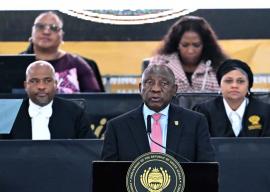
For the next five years, government’s overriding priority is to achieve more rapid and inclusive economic growth so that it can create jobs, reduce poverty, and build a more just and equal society.
“To achieve this, we must configure the system of government to support a significant expansion of investment in infrastructure. We have seen the value of collaboration in pursuing this objective,” President Cyril Ramaphosa said on Tuesday in Parliament.
Tabling the Presidency’s Budget Vote, President Ramaphosa said through Infrastructure South Africa, government has been able to draw on private sector expertise and skills to improve the preparation, financing and implementation of infrastructure investment.
“Through the Infrastructure Fund, we are going to explore new approaches to blended financing of infrastructure, using the fiscus to leverage additional funding from the private sector, development finance institutions and other sources.
“We have been working closely with Independent Power Producers in steering their projects through to the construction phase, contributing significantly to the reduction in the severity of load shedding.
“We are going to continue working with companies, financial institutions and business organisations, both South African and international, during the course of our ambitious investment drive over the last five years,” the President said.
In 2018, government set a target of mobilising R1.2 trillion in new investments over five years.
“By the conclusion of the fifth South Africa Investment Conference last year, government had exceeded that target, raising over R1.5 trillion in new investment commitments.
“We have had an opportunity to visit many of the factories and projects that have been built or expanded as a result of these investments and we have seen the many jobs they have created,” the President said.
Red tape reduction efforts
As part of efforts to enhance the business environment and create much-needed jobs, a team to address red tape reduction in government was established in The Presidency.
“The work of the red tape reduction team that was established in the Presidency under the leadership of Mr Sipho Nkosi has been possible due to close cooperation with various departments, public entities and spheres of government, as well as support from the private sector.
“The team is looking at a capacity building approach to tackle red tape in provincial governments and a pilot to support three city municipalities with reform action plans to address inefficient business processes.
“Through this experience, it is clear that the removal of red tape is a cross-cutting exercise that requires a coordinated and integrated approach. Significant progress was made during the sixth administration in implementing reforms to enable economic growth, with a focus on modernising network industries,” President Ramaphosa said.
These reforms have been undertaken across government with the support of Operation Vulindlela, which is a joint initiative of the Presidency and National Treasury that seeks to accelerate the implementation of structural reforms and support economic recovery.
“This progress provides a solid platform on which we will build a sustained increase in the rate of economic growth and a reduction in poverty, unemployment and inequality.
“By alleviating load shedding, improving the performance of the logistics system, reducing the cost of data, improving water supply, and enabling the country to attract the skills it needs, the reforms already underway will provide a significant boost to the economy in the medium term,” the President said.
In addition, these reforms support the repositioning of strategic state-owned enterprises by strengthening their balance sheets and improving their operational performance, while also enabling higher levels of private investment in infrastructure.
A recent independent study released by the Bureau of Economic Research estimates that the reforms undertaken under the auspices of Operation Vulindlela could increase real Gross Domestic Product growth to 3.5 percent by 2029.
“Apart from the changes that these reforms are making to the country’s productive capacity and competitiveness, they are also contributing to greater business confidence. As confidence grows, so does investment, creating jobs and supporting demand. This is a virtuous cycle that leads to higher growth on a sustained basis,” the President said.
Government will now embark on the second phase of Operation Vulindlela.
“The immediate priority is to sustain the momentum and follow through on the implementation of current reforms to realise their full impact. While these reforms are a necessary condition for growth and job creation, they are not sufficient to drive structural transformation in the economy,” President Ramaphosa said.
In its second phase, Operation Vulindlela will therefore focus on reforming the local government system, harnessing digital public infrastructure, and addressing spatial inequality.
“We will work closely with provincial and local governments to address service delivery challenges, in line with our Constitutional mandate. We will coordinate a whole-of-government programme to drive digital transformation of government and modernise our digital public infrastructure.
“Finally, we will turn the attention of Operation Vulindlela to spatial inequality, which remains a key barrier to economic growth,” the President said. – SAnews.gov.za


